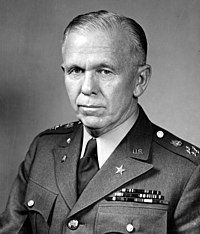George C. Marshall Foundation

The George C. Marshall Foundation in Lexington, Virginia, honors the legacy of George Catlett Marshall, who was Army Chief of Staff during World War II, Secretary of State and Secretary of Defense following World War II and the only person to hold all three high offices.
The Foundation
The Foundation is located in Lexington, Virginia, and contains a library, archive, a museum and administrative offices dedicated to celebrating the legacy of George Catlett Marshall. The Foundation opened in 1964 in its own building on the post of and separate from the Virginia Military Institute, Marshall's alma mater. The Foundation offers educational programs and facilities for use by members, the general public, amateur historians, scholars, and students of all ages.

The Marshall Foundation's Mission
The non-profit, nonpartisan, independent Marshall Foundation is where the values that shaped and motivated Marshall are kept alive. As a unique resource, the Foundation perpetuates Marshall's legacy as the person who "won the war and won the peace," his leadership qualities and exemplary character through educational programs and facilities such as a world-class archives and research library and a museum that offer a wide range of resources and materials for use by members, the general public, amateur historians, scholars and students of all ages.
Marshall Museum
The Marshall Museum is open to the public and displays exhibits of Marshall's life and work in the entry hall and two adjacent galleries, one focused on his military career and the other on his achievements following World War II. Visitors will see the medallion and certificate of his 1953 Nobel Peace Prize. An admission fee is charged. The Museum is closed on Sundays and Mondays. Check website for hours.
Marshall Library and Archives
The Marshall Foundation Library and Archives cover United States military & diplomatic history between the years of George Marshall's career as a military officer and public servant, roughly 1900-1960. Along with sorted paper collections, the library contains more than 23,000 manuscripts, two million documents including many from the National Archives and Records Administration, hundreds of era maps, thousands of photographs, 700 posters from all countries involved in both World Wars, films, and over 200 oral histories.
The Marshall Legacy Series
The George C. Marshall Legacy Series interprets General Marshall's legacy through a multi-year series of events, programs and information centered on key themes, events or episodes in General Marshall's career. Because his career touched nearly every major event of the first half of the 20th Century, the landscape for the Series is rich and vast. The Foundation has accessed its own resources and collections to create unique activities and events to share with the public.
The Legacy Series provides an exposition of the key moments in General Marshall's life through selected documents and artifacts from the archives, articles, audiovisual presentations, unique museum exhibitions and speaker events and in doing so fleshes out who he was, what he did, how he did it and why he is still so relevant today. The goal is to make Marshall's career and achievements popularly accessible and emphasize the Foundation's unique position as the principal organization, nationally and internationally, that commemorates Marshall and defines his legacy.
Marshall Legacy Series Sequences:
• Codebreaking, April—June 2015
• Weapons of War, July—September 2015
• Taking Care of the Troops, October—December 2015
• All Who Want to Serve, January-April 2016
• Speed and Fury, May-August 2016
• Let's Get A Move On, September-December 2016
• The World Wars, January-December 2017
• Europe's Unlikely Recovery, January-June 2018
• "Friends" in High Places, July–November 2018
• Winter's Coming, TBD
• The Man for All Seasons, TBD
Marshall Foundation Awards
In 1997, the George C. Marshall Foundation Award was established in commemoration of the 50th anniversary of the Marshall Plan. The award is given to an individual or organization that "has made a significant contribution internationally to ameliorating hunger, poverty, desperation and chaos, as described by Secretary of State Marshall in his speech at Harvard University, June 1947."[1] Recipients include Henry Kissinger, Hillary Clinton, Robert Gates, Colin Powell, George H. W. Bush, David Rockefeller, and Helmut Kohl, among others.
General Andrew Goodpaster served as a trustee and a chairman of the George C. Marshall Foundation, which established the Andrew J. Goodpaster Award to honor "American business leaders, politicians, military leaders and others who have served our nation in exemplary ways, who, like General Goodpaster, have exhibited great courage, selfless service, patriotism and leadership in their lives and careers."[2] Recipients include Mark A. Milley, Richard Cody, John P. Jumper, Raymond T. Odierno, Gordon R. Sullivan, and Brent Scowcroft.
The George C. Marshall Foundation Humanitarian Award is presented to an individual or an organization to recognize their significant humanitarian service, create public awareness of the accomplishments of the recipient individual or organization and to encourage others to emulate their good works The George C. Marshall Foundation Humanitarian Award Recipients include Michael R. Bloomberg
References
External links
- The George C. Marshall Foundation
- The George C. Marshall Foundation gallery, Google Cultural Institute
- Gates Receives George C. Marshall Award, Department of Defense Photo Essay
